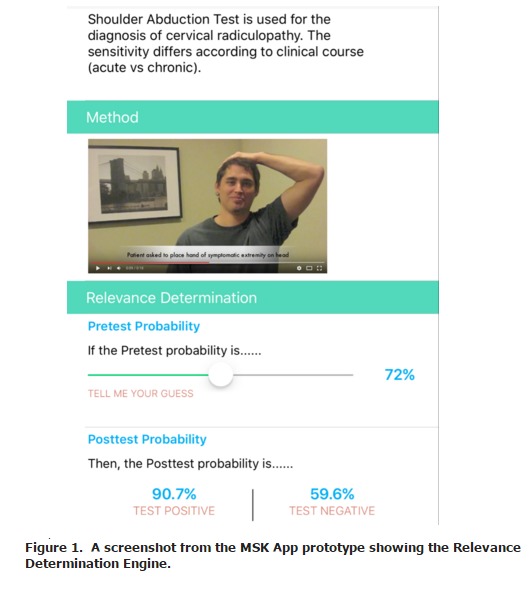Session Information
Date: Tuesday, November 15, 2016
Title: Education
Session Type: ACR Concurrent Abstract Session
Session Time: 4:30PM-6:00PM
Background/Purpose:
The physical exam is an essential part of the assessment of patients with musculoskeletal (MSK) complaints. Few doctors are aware of the sensitivity and specificity of special tests in the MSK exam, which leads to misconceptions regarding the relevance of a particular maneuver. Relevance can be further elucidated by determining the pre- and post-test probability of a particular diagnosis. However, it is impractical to perform these types of calculations at the bedside. To address this issue, we developed the MSK Application (app) based on a clinical decision-making support system with the major feature being called the ‘Relevance Determination Engine’.Methods:
A team of residents was created to generate ideas and outline an approach to the app’s development. A literature search was performed to review the evidence behind various examination techniques in terms of sensitivity and specificity. We chose the Apple operating system (iOS) platform and used Xcode 8 as the software development tool. Information on each special test in the MSK exam was converted into JavaScript object notation language, which is simple and facilitates continuous maintenance by team members who are not technologically savvy. The app design is consistent with iOS Human Interface Guidelines. It will be published to the App Store in July, 2016.Results:
The MSK App allows users to search for a special test in the MSK exam according to anatomical region, patient’s symptoms or differential diagnosis. A summary of how to perform the exam, as well as the sensitivity, specificity and likelihood ratios are given. Users are also provided with a link to a YouTube video demonstrating the exam. The app serves as a teaching tool in evidence-based medicine (EBM) by highlighting the relevance of each special test. This is achieved by utilizing a feature called the ‘Relevance Determination Engine’, which automatically calculates the post-test probability for a test. The default pre-test probability of 50% can be adjusted with simple manipulation of a slider bar (Figure 1).Conclusion:
The MSK App is an exciting and innovative approach to education at the bedside developed by residents for residents and medical students. It bridges the gap between physical diagnosis and EBM by calculating point-of-care post-test probability. Further developments will expand content by adding pictures and videos. Data from user surveys will also be analyzed.
Disclosure: J. A. Tabanor, None; J. Park, None; H. A. Hanson, None; H. H. Oo, None.
To cite this abstract in AMA style:
Tabanor JA, Park J, Hanson HA, Oo HH. From Art to Science: A Mobile App for Point-of-Care Relevance Determination for the Musculoskeletal Exam [abstract]. Arthritis Rheumatol. 2016; 68 (suppl 10). https://acrabstracts.org/abstract/from-art-to-science-a-mobile-app-for-point-of-care-relevance-determination-for-the-musculoskeletal-exam/. Accessed .« Back to 2016 ACR/ARHP Annual Meeting
ACR Meeting Abstracts - https://acrabstracts.org/abstract/from-art-to-science-a-mobile-app-for-point-of-care-relevance-determination-for-the-musculoskeletal-exam/

